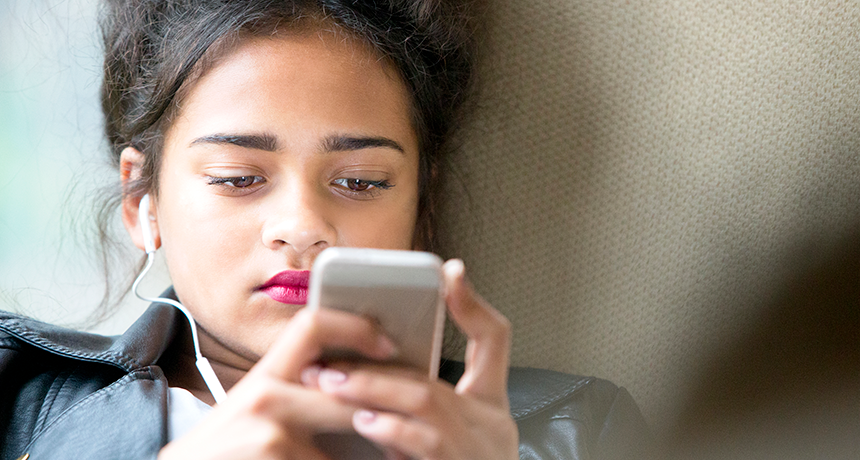Social media doesn’t, by itself, make teens unhappy or anxious
Cyberbullying is more to blame for teen unhappiness than is ‘screen time’

Girls who use social media are most likely to be unhappy when they are cyberbullied.
SolStock/E+/Getty Images Plus
Friendships and social connections are important parts of teens’ lives. But busy young people can’t always connect in person. Social media apps such as Snapchat and Instagram make it easy to keep in touch. Some research has shown, however, that using social media can harm mental health, especially in teens. A study now finds that social media alone isn’t what causes those problems.
Other factors, such as bullying, combine with social media use to bring moods down, the new data show.
Many scientists have looked at the effects of social media on the health of kids and teens. Most of their studies were brief and offered only a snapshot in time. Russell Viner and Dasha Nicholls wanted to see how hanging out on social media, as well as other behaviors, influenced well-being over a period of years. Viner studies adolescent health at University College London in England. Nicholls studies adolescent mental health at Imperial College London.
The team used data from a previous study that started in 2013. Run by England’s Department of Education, it included 13,000 British 13- and 14-year-olds. All were in ninth grade, initially, and answered a variety of questions. These asked about school — such as whether the teens missed class, completed their work or were bullied. They also asked how much sleep and exercise the teens got and how well they felt overall. This addressed teens’ physical health and their mental well-being. Finally, the teens were asked if about their participation in risky behaviors such as smoking, drinking or drug use. Again in 10th and 11th grades, the teens answered the same questions.
Lack of sleep and exercise are known to decrease happiness and to increase anxiety. So is cyberbullying. The original study included information on all of these behaviors. Nicholls and Viner mined those data from the earlier study.
The team divided the teens into three groups based on how often they used social media apps such as Snapchat or Instagram. The first group used those apps more than three times a day. The second group checked their social media accounts two or three times a day. And the final group reported using social media no more than once a day. The researchers also looked at boys and girls separately, because their activities and behaviors might differ.
Not just social media
The teens used social media more as they got older. Just 43 percent of all ninth graders checked social media three or more times a day. By 11th grade, the share was up 68 percent. Girls tended to log onto social media more than boys. Seventy-five percent of 11th-grade girls checked social media three or more times a day, compared to 62 percent of boys their age.
Boys and girls reported greater anxiety and more unhappiness in 11th grade than in previous years. That pattern was strongest in girls. The researchers wondered whether social media was to blame.
Because other behaviors might be the real culprits, the researchers dug into the data more closely. And among girls, they found, unhappiness and anxiety were linked most strongly to lack of sleep, lack of exercise and being cyberbullied.
Reports Nicholls, “Checking social media on its own had no effect on mental well-being for girls who were not being cyberbullied, sleeping more than eight hours a night and getting some exercise.”
Boys who used social media a lot also were less happy and more anxious. But there was no clear link between their emotional well-being and their sleep, exercise or experiences with cyberbullying. “Boys were generally getting more exercise in the study,” Nicholls notes. They also checked social media less than the girls did. “Other things might make the difference [in] whether frequent social media use is a good or bad thing for boys,” she observes.
Her team’s findings appear in the October 1 issue of The Lancet Child & Adolescent Health.
“I agree with the view that ‘screen time’ is a simplistic concept,” says Yoon Hyung Choi. She is an expert on social media and well-being at Cornell University in Ithaca, N.Y. “It matters how teens are using technology,” she notes. Using it to talk with friends and family or as an outlet for creative expression can be good. Getting cyberbullied or accessing harmful content? Not so much. This study was a step in the right direction, Choi concludes. It looked behind the curtain to see how social media affects teens.
The best course of action, says Nicholls, would be to get enough sleep. How much is that? At least eight hours a night. It’s also critical to get enough exercise, which boosts mood. And if social media has become a stressor, check it less often, she says. Or only connect with people who have a positive impact.







